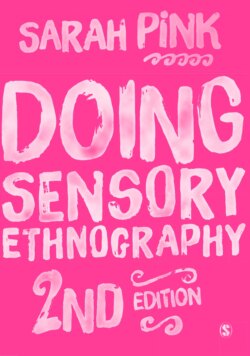Читать книгу Doing Sensory Ethnography - Sarah Pink - Страница 25
На сайте Литреса книга снята с продажи.
An interdisciplinary context for sensory ethnography
ОглавлениеSince the early twenty-first century an increasingly interdisciplinary focus on the senses has emerged. This has been promoted through a series of edited volumes including Howes’ Empire of the Senses (2005a). These collections unite the work of academics from a range of disciplines to explore sensory aspects of culture and society (Howes, 2005a) using modern western categories of audition (Bull and Back, 2003), smell (Drobnick, 2006), taste (Korsmeyer, 2005), touch (Classen, 2005) and visual culture (Edwards and Bhaumik, 2008). According to Howes this increased focus on the senses represents a ‘sensual revolution’ – an ideological move that has turned ‘the tables and recover(ed) a full-bodied understanding of culture and experience’ as opposed to one that is modelled on linguistics (2005a: 1; see also Howes, 2003). Although some would disagree that the revolution contra linguistics (e.g. Bendix, 2006: 6) should be the central concern of a sensory approach to ethnography, Howes is correct that the senses have come to the fore in the work of many contemporary academics. Moreover, as we have seen in this chapter, the senses are becoming increasingly important to scholarship and research across social science, arts and humanities disciplines – including design, geography, anthropology, sociology and arts practice. In what is an increasingly interdisciplinary context for scholarship and practice within these fields – for instance, with the emergence of design anthropology and the connections between anthropology and arts practice – as well as between the social, technological, engineering sciences and medical sciences more generally, we can see how the theoretical, methodological and practical emphasis on the senses in the social sciences and humanities is also having impact through them in wider fields. Therefore, for example, in my own experience of working with designers, engineers and construction industry experts, a sensory ethnography approach can inform the development of strong research collaborations that bring to interdisciplinary and hard-to-address research problems, new ways of knowing that are not usually applied in those fields.
